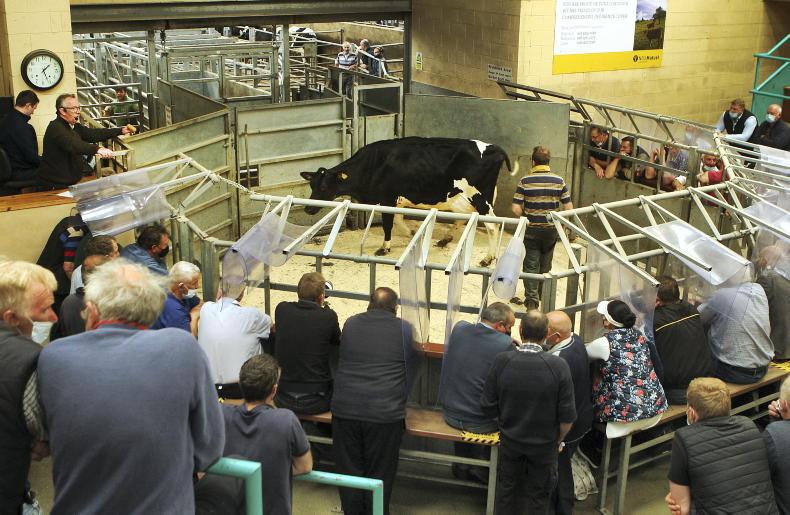In the last few days, mainstream media attention has turned to a tribunal case from last autumn, involving a former DAERA vet.
The judge-led tribunal ruling, issued to contesting parties on 22 September 2021, was that Dr Tamara Bronckaers, a former supervisory veterinary officer within DAERA Veterinary Service, was constructively dismissed from her post.
The final pay-out in the case is expected to be in the region of £1m.
In her final years employed by DAERA, Dr Bronckaers had responsibility for licensing, operation, biosecurity and associated enforcement within livestock marts.
During that period, she had raised various issues with her line management, but contended that those recommendations were ignored and management had “closed ranks”. She resigned on 27 February 2018.
Context
While only DAERA senior management can justify how Dr Bronckaers’ concerns were addressed, it is important that they are put into context, as the commentary currently coming forward has the potential to be very damaging for the NI livestock industry.
The key issue raised by Dr Bronckaers is a so-called “deleted moves policy” relating to cattle movements out of livestock marts.
The DAERA APHIS system has a 'front end', where information on cattle movements is available to marts and abattoirs, and a 'back end' where all movements of livestock are recorded.
At the front end, a mart is allowed to delete a move when cattle are still on site or when in transit to a buyer’s premises.
This system facilitates cattle dealers who might initially buy a number of animals at a mart sale and once their business is finished, work out which customer is actually to take each animal.
Alternative
The alternative is that the move into the dealer’s herd is not deleted, but this would mean that even though an animal might only have been in that herd for a couple of hours, it would now show up as a new farm residency.
That is important because of a rule imposed by supermarkets which limits each animal to a maximum of four farm residencies.
Cattle with more than four residencies are severely penalised by factories or not wanted at all.
If a couple of hours in a dealer’s herd counts as a residency, it would amount to a significant problem for NI agriculture.
What Dr Bronckaers found was that the “deleted moves policy” was being abused and, in some cases, it could be up to 50 hours later before the animal was registered to a new herd.
She also raised concerns that the animals might initially have gone to a TB-infected herd (owned by a dealer), before being moved on to a TB-free herd.
In one particular week, she identified that 30 out of the 90 deleted moves were initially to herds that were not TB-free.
Where the system was being abused, Dr Bronckaers wanted the marts warned and potentially enforcement action taken.
Animal welfare
Separately, she also raised concerns about animal welfare in some marts, particularly where sheep were held overnight without food or water, and issues around traceability relating to untagged sheep being sold.
For those of us who work in the farming industry, the reality is that the issues raised by Dr Bronckaers appear relatively minor and for her line management dealing with the fallout of Brexit and the ongoing battle with TB, perhaps they felt the same.
The figures presented during the tribunal suggest that around 5,000 cattle in NI had moves deleted on APHIS, which works out at 0.3% of the NI cattle population.
It is important to point out that the back end of APHIS still records the animal going through a dealer’s herd, so the Department can still trace all movements.
And if there wasn’t a residency rule created by supermarkets, there would be no need for any of this at all.
TB issue
On the issue of TB, there is no doubt that farmers can do better around the whole issue of biosecurity.
However, the historic failure of political leaders and DAERA to tackle this disease has created widespread apathy and a sense of resignation among farmers.
Of course, it is not ideal if cattle spend a few hours on a holding that has TB, but it is hard to believe that this is a big risk in the spread of this complex disease.
Given the prevalence of TB across NI, it is nigh impossible for a cattle dealer to remain free of TB long term.
While some in the industry might question the role of cattle dealers, the reality is that they play a vital function in ensuring farmers get a fair price for their livestock.
And with more farmers now part-time, few people can spend the day in a mart trying to buy a couple of cattle.
Welfare
When it comes to sheep standing overnight in a mart without food or water, it is unlikely to cause them any significant stress, but, at the same time, we have to be aware of public perception.
Animal welfare has to be a top priority on farms, marts and abattoirs.
Nonsensical
But some of the commentary around all these issues has been nonsensical, with suggestions that it raises serious concerns around our animal traceability system and even questions raised about food safety.
That is an insult to the thousands of people in NI who rely on farming and food processing for their living and who must follow daily a raft of various rules and regulations.
Read more
Ex DAERA vet wins unfair dismissal case
TB - a strategy eight years in the making
In the last few days, mainstream media attention has turned to a tribunal case from last autumn, involving a former DAERA vet.
The judge-led tribunal ruling, issued to contesting parties on 22 September 2021, was that Dr Tamara Bronckaers, a former supervisory veterinary officer within DAERA Veterinary Service, was constructively dismissed from her post.
The final pay-out in the case is expected to be in the region of £1m.
In her final years employed by DAERA, Dr Bronckaers had responsibility for licensing, operation, biosecurity and associated enforcement within livestock marts.
During that period, she had raised various issues with her line management, but contended that those recommendations were ignored and management had “closed ranks”. She resigned on 27 February 2018.
Context
While only DAERA senior management can justify how Dr Bronckaers’ concerns were addressed, it is important that they are put into context, as the commentary currently coming forward has the potential to be very damaging for the NI livestock industry.
The key issue raised by Dr Bronckaers is a so-called “deleted moves policy” relating to cattle movements out of livestock marts.
The DAERA APHIS system has a 'front end', where information on cattle movements is available to marts and abattoirs, and a 'back end' where all movements of livestock are recorded.
At the front end, a mart is allowed to delete a move when cattle are still on site or when in transit to a buyer’s premises.
This system facilitates cattle dealers who might initially buy a number of animals at a mart sale and once their business is finished, work out which customer is actually to take each animal.
Alternative
The alternative is that the move into the dealer’s herd is not deleted, but this would mean that even though an animal might only have been in that herd for a couple of hours, it would now show up as a new farm residency.
That is important because of a rule imposed by supermarkets which limits each animal to a maximum of four farm residencies.
Cattle with more than four residencies are severely penalised by factories or not wanted at all.
If a couple of hours in a dealer’s herd counts as a residency, it would amount to a significant problem for NI agriculture.
What Dr Bronckaers found was that the “deleted moves policy” was being abused and, in some cases, it could be up to 50 hours later before the animal was registered to a new herd.
She also raised concerns that the animals might initially have gone to a TB-infected herd (owned by a dealer), before being moved on to a TB-free herd.
In one particular week, she identified that 30 out of the 90 deleted moves were initially to herds that were not TB-free.
Where the system was being abused, Dr Bronckaers wanted the marts warned and potentially enforcement action taken.
Animal welfare
Separately, she also raised concerns about animal welfare in some marts, particularly where sheep were held overnight without food or water, and issues around traceability relating to untagged sheep being sold.
For those of us who work in the farming industry, the reality is that the issues raised by Dr Bronckaers appear relatively minor and for her line management dealing with the fallout of Brexit and the ongoing battle with TB, perhaps they felt the same.
The figures presented during the tribunal suggest that around 5,000 cattle in NI had moves deleted on APHIS, which works out at 0.3% of the NI cattle population.
It is important to point out that the back end of APHIS still records the animal going through a dealer’s herd, so the Department can still trace all movements.
And if there wasn’t a residency rule created by supermarkets, there would be no need for any of this at all.
TB issue
On the issue of TB, there is no doubt that farmers can do better around the whole issue of biosecurity.
However, the historic failure of political leaders and DAERA to tackle this disease has created widespread apathy and a sense of resignation among farmers.
Of course, it is not ideal if cattle spend a few hours on a holding that has TB, but it is hard to believe that this is a big risk in the spread of this complex disease.
Given the prevalence of TB across NI, it is nigh impossible for a cattle dealer to remain free of TB long term.
While some in the industry might question the role of cattle dealers, the reality is that they play a vital function in ensuring farmers get a fair price for their livestock.
And with more farmers now part-time, few people can spend the day in a mart trying to buy a couple of cattle.
Welfare
When it comes to sheep standing overnight in a mart without food or water, it is unlikely to cause them any significant stress, but, at the same time, we have to be aware of public perception.
Animal welfare has to be a top priority on farms, marts and abattoirs.
Nonsensical
But some of the commentary around all these issues has been nonsensical, with suggestions that it raises serious concerns around our animal traceability system and even questions raised about food safety.
That is an insult to the thousands of people in NI who rely on farming and food processing for their living and who must follow daily a raft of various rules and regulations.
Read more
Ex DAERA vet wins unfair dismissal case
TB - a strategy eight years in the making










SHARING OPTIONS